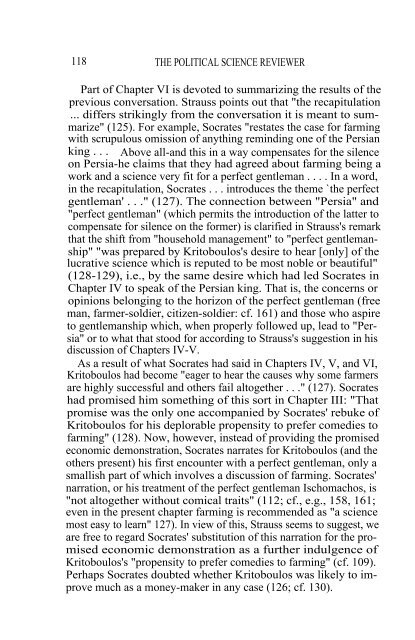Strauss on Xenophon's Socrates Xenophon's Socratic Discourse: An ...
Strauss on Xenophon's Socrates Xenophon's Socratic Discourse: An ...
Strauss on Xenophon's Socrates Xenophon's Socratic Discourse: An ...
Create successful ePaper yourself
Turn your PDF publications into a flip-book with our unique Google optimized e-Paper software.
118 THE POLITICAL SCIENCE REVIEWER<br />
Part of Chapter VI is devoted to summarizing the results of the<br />
previous c<strong>on</strong>versati<strong>on</strong>. <str<strong>on</strong>g>Strauss</str<strong>on</strong>g> points out that "the recapitulati<strong>on</strong><br />
... differs strikingly from the c<strong>on</strong>versati<strong>on</strong> it is meant to summarize"<br />
(125). For example, <strong>Socrates</strong> "restates the case for farming<br />
with scrupulous omissi<strong>on</strong> of anything reminding <strong>on</strong>e of the Persian<br />
king . . . Above all-and this in a way compensates for the silence<br />
<strong>on</strong> Persia-he claims that they had agreed about farming being a<br />
work and a science very fit for a perfect gentleman . . . . In a word,<br />
in the recapitulati<strong>on</strong>, <strong>Socrates</strong> . . . introduces the theme `the perfect<br />
gentleman' . . ." (127). The c<strong>on</strong>necti<strong>on</strong> between "Persia" and<br />
"perfect gentleman" (which permits the introducti<strong>on</strong> of the latter to<br />
compensate for silence <strong>on</strong> the former) is clarified in <str<strong>on</strong>g>Strauss</str<strong>on</strong>g>'s remark<br />
that the shift from "household management" to "perfect gentlemanship"<br />
"was prepared by Kritoboulos's desire to hear [<strong>on</strong>ly] of the<br />
lucrative science which is reputed to be most noble or beautiful"<br />
(128-129), i.e., by the same desire which had led <strong>Socrates</strong> in<br />
Chapter IV to speak of the Persian king. That is, the c<strong>on</strong>cerns or<br />
opini<strong>on</strong>s bel<strong>on</strong>ging to the horiz<strong>on</strong> of the perfect gentleman (free<br />
man, farmer-soldier, citizen-soldier: cf. 161) and those who aspire<br />
to gentlemanship which, when properly followed up, lead to "Persia"<br />
or to what that stood for according to <str<strong>on</strong>g>Strauss</str<strong>on</strong>g>'s suggesti<strong>on</strong> in his<br />
discussi<strong>on</strong> of Chapters IV-V.<br />
As a result of what <strong>Socrates</strong> had said in Chapters IV, V, and VI,<br />
Kritoboulos had become "eager to hear the causes why some farmers<br />
are highly successful and others fail altogether . . ." (127). <strong>Socrates</strong><br />
had promised him something of this sort in Chapter III: "That<br />
promise was the <strong>on</strong>ly <strong>on</strong>e accompanied by <strong>Socrates</strong>' rebuke of<br />
Kritoboulos for his deplorable propensity to prefer comedies to<br />
farming" (128). Now, however, instead of providing the promised<br />
ec<strong>on</strong>omic dem<strong>on</strong>strati<strong>on</strong>, <strong>Socrates</strong> narrates for Kritoboulos (and the<br />
others present) his first encounter with a perfect gentleman, <strong>on</strong>ly a<br />
smallish part of which involves a discussi<strong>on</strong> of farming. <strong>Socrates</strong>'<br />
narrati<strong>on</strong>, or his treatment of the perfect gentleman Ischomachos, is<br />
"not altogether without comical traits" (112; cf., e.g., 158, 161;<br />
even in the present chapter farming is recommended as "a science<br />
most easy to learn" 127). In view of this, <str<strong>on</strong>g>Strauss</str<strong>on</strong>g> seems to suggest, we<br />
are free to regard <strong>Socrates</strong>' substituti<strong>on</strong> of this narrati<strong>on</strong> for the promised<br />
ec<strong>on</strong>omic dem<strong>on</strong>strati<strong>on</strong> as a further indulgence of<br />
Kritoboulos's "propensity to prefer comedies to farming" (cf. 109).<br />
Perhaps <strong>Socrates</strong> doubted whether Kritoboulos was likely to improve<br />
much as a m<strong>on</strong>ey-maker in any case (126; cf. 130).

















